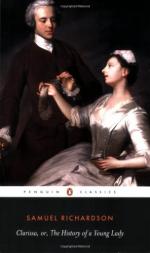But whatever it might be to Sally, it was no disappointment to Mr. Lovelace, to find his mistress of no higher degree; because he hoped to reduce her soon to the lowest condition that an unhappy woman can fall into.
But when Miss Martin had informed herself that her lover was the nephew and presumptive heir of Lord M. she thought him the very man for whom she had been so long and so impatiently looking out; and for whom it was worth her while to spread her toils. And here it may not be amiss to observe, that it is very probable that Mr. Lovelace had Sally Martin in his thoughts, and perhaps two or three more whose hopes of marriage from him had led them to their ruin, when he drew the following whimsical picture, in a letter to his friend Belford, not inserted in the preceding collection:
‘Methinks,’ says he, ’I see a young couple in courtship, having each a design upon the other: the girl plays off: she is very happy as she is: she cannot be happier: she will not change her single state: the man, I will suppose, is one who does not confess, that he desires not that she should: she holds ready a net under her apron; he another under his coat; each intending to throw it over the other’s neck; she over his, when her pride is gratified, and she thinks she can be sure of him; he over her’s, when the watched-for yielding moment has carried consent too far. And suppose he happens to be the more dexterous of the two, and whips his net over her, before she can cast her’s over him; how, I would fain know, can she cast her’s over him; how, I would fain know, can she be justly entitled to cry out upon cruelty, barbarity, deception, sacrifices, and all the rest of the exclamatory nonsense, with which the pretty fools, in such a case, are wont to din the ears of their conquerors? Is it not just, thinkest thou, when she makes her appeal to gods and men, that both gods and men should laugh at her, and hitting her in the teeth with her own felonious intentions, bid her sit down patiently under her deserved disappointment?’
In short, Sally’s parents, as well as herself, encouraged Mr. Lovelace’s visits. They thought they might trust to a discretion in he which she herself was too wise to doubt. Pride they knew she had; and that, in these cases, is often called discretion.—Lord help the sex, says Lovelace, if they had not pride!—Nor did they suspect danger from that specious air of sincerity, and gentleness of manners, which he could assume or lay aside whenever he pleased.
The second masquerade, which was no more than their third meeting abroad, completed her ruin, from so practised, though so young a deceiver; and that before she well knew she was in danger; for, having prevailed on her to go off with him about twelve o’clock to his aunt Forbes’s, a lady of honour and fortune, to whom he had given reason to expect her future niece, [the only hint of marriage he ever gave her,] he carried her off to the house of the wicked woman, who bears the name of Sinclair in these papers; and there, by promises, which she understood in the favourable sense, (for where a woman loves she seldom doubts enough for her safety,) obtained an easy conquest over a virtue that was little more than nominal.




